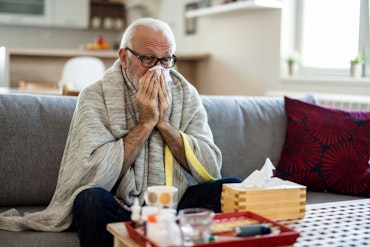Seniors’ needs in the spotlight for National Nutrition Week
The importance of positive eating habits and adequate nutritional intake among older Australians is once again in the spotlight as part of National Nutrition Week 2018.

15 percent of those aged over 65 living in the community receiving care have poor nutrition (Source: Shutterstock)
Running from 14-20 October, the awareness week aims to highlight the importance of good nutrition among Australians of all ages, with a number of dietitians, nutritionists, and organisations taking the opportunity to focus on seniors.
Dietitian and founder of the Lantern Project, Dr Cherie Hugo, has long had a passion for the nutritional health and wellbeing of older Australians and aged care residents and says there are many benefits worth highlighting to the community this National Nutrition Week.
“Good nutrition improves health outcomes, reduces the risk of falls, minimises hospital re-admissions and offers general health and quality of life benefits for older Australians,” she explains.
“If people are not eating well – which we see particularly among those eating alone and cooking for one – diet quality can be poorer, with seniors eating tea and toast rather than a well-balanced meal.
“This can result in some negative consequences and negative moods so it is important we look at ways to fill those gaps for people.”
Dr Hugo further highlights the importance of working with older Australians on their nutrition, referring to recent confronting statistics.
“We know poor nutrition among older people is an issue – it’s absolutely an issue,” she says.
“Statistics show us that 15 percent of those aged over 65 living in the community receiving care have poor nutrition, compared to one in two – or 50 percent – of residents in nursing homes.”
She adds that “getting nutrition right” for older people is vital.
“Getting it right not only provides a number of health benefits, but it also provides an avenue of cost saving for the Government – it’s a proactive approach,” Dr Hugo explains.
“For those living alone, I would recommend planning ahead and cooking larger meals and freezing them – it can be rather helpful when cooking for one – or look for the opportunity to share a meal with someone, be it friends, family or even neighbours.
“Having a social connection can make a difference.
“It is also important for older people to focus on meeting their protein needs because these needs increase as we age, despite our appetites often decreasing.
“So we need to look at different ways to reach that intake – think more dairy, meat, fish, chicken and eggs.”
Home care provider Home Instead Senior Care have also taken hold of National Nutrition Week as an opportunity to also focus on older people, promoting one of their in-house resources and debunking a number of myths.
Their resource, ‘Nutrition for Seniors: A guide to healthy habits for eating well as you age’, was developed by dietitian and author Ngaire Hobbins, who is sharing her thoughts as part of the awareness week.
“Research has found that up to 30 percent of older people living in the community are either malnourished or at risk of malnutrition,” she says.
“This is generally the result of our lack of awareness that seniors have different nutrition needs and that their eating patterns need to change with age to support their physical and mental capacity.
“It may also be due to social isolation and/or reduced physical/cognitive capacity, which is where the support and wonderful services of Home Instead Senior Care comes to the fore.
“I am thrilled to have collaborated with [them] on Nutrition for Seniors as it provides seniors and loved ones with insights into the way nutrition needs to change with age while offering practical advice and guidance.”
Some of the advice and guidance Ms Hobbins also offers in the wake of National Nutrition Week is the debunking of some “common myths”
“Your appetite may change but your stomach doesn’t shrink when you get older,” she explains.
“Not eating well enough actually accelerates the ageing process.
“It is true that your metabolism will slow down and your energy levels will decrease.
“Food and eating are important components as it protects and fuels you. Keep in mind you may need more foods than others, particularly foods which are rich in protein, vitamins and minerals.”
Ms Hobbins also emphasises the debunking of one myth in particular – that malnutrition is a normal part of the ageing process.
“Malnutrition is not normal and can affect anyone,” she says.
“Don’t dismiss the warning signs as being part of ‘old age’.”
Dr Hugo further elaborates on this, highlighting some of the warning signs.
“If someone experiences unintentional weight loss, that is a red flag and may indicate malnutrition risk,” she explains.
“It is also to be aware of poor appetite and if you notice it has been down for more than a couple of days, look into it and investigate why that is and don’t let it continue.”
More information on National Nutrition Week can be found online, with free access to Home Instead Senior Care’s Nutrition for Seniors also available online.











![The new Aged Care Act exposure draft is slated for release in December of 2023, but advocates hope to see it rolled out on January 1, 2024. [Source: Shutterstock]](https://agedcareguide-assets.imgix.net/news/articles/wp/agedcareact__0811.jpg?fm=pjpg&w=520&format=auto&q=65)












Comments